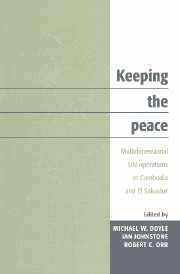Book contents
- Frontmatter
- Contents
- Preface
- Notes on the contributors
- List of abbreviations
- 1 Introduction
- Cambodia
- Map
- 2 Three visions of politics in Cambodia
- 3 The political dynamics of the peacemaking process in Cambodia
- 4 The Cambodian Settlement Agreements
- 5 Holding a fragile peace: the military and civilian components of UNTAC
- 6 Authority and elections in Cambodia
- 7 Returning home: the repatriation of Cambodian refugees
- 8 Quick impacts, slow rehabilitation in Cambodia
- El Salvador
- Conclusion and chronologies
- Select bibliography
- Index
2 - Three visions of politics in Cambodia
Published online by Cambridge University Press: 22 October 2009
- Frontmatter
- Contents
- Preface
- Notes on the contributors
- List of abbreviations
- 1 Introduction
- Cambodia
- Map
- 2 Three visions of politics in Cambodia
- 3 The political dynamics of the peacemaking process in Cambodia
- 4 The Cambodian Settlement Agreements
- 5 Holding a fragile peace: the military and civilian components of UNTAC
- 6 Authority and elections in Cambodia
- 7 Returning home: the repatriation of Cambodian refugees
- 8 Quick impacts, slow rehabilitation in Cambodia
- El Salvador
- Conclusion and chronologies
- Select bibliography
- Index
Summary
Introduction
At the end of 1993 Cambodia began a new phase of its history. Equipped with a new constitution, a refurbished monarchy and a 120-member National Assembly split between royalist, republican, and former socialist parties, the country is a contradiction in terms that seems to be working. Political actors from the past crowd the stage, or lurk in the wings. The country's poverty is abysmal, with per capita GDP estimated to be 50 percent lower than it had been in 1966. The future is impossible to predict, but the political and social history of Cambodia since World War II helps provide insight into the current situation.
In the twilight of the French colonial era, in 1945, an independent Cambodia emerged briefly when it was given independence by Japan, only to revert to French control at the beginning of 1946. Since then, its political history can be described as a struggle among factions and visions of order. Three of these visions – royalism, parliamentarianism, and socialism – have competed for power and allegiance. The visions have been shared and contested by different sectors of Cambodian society and supported from time to time by foreign powers. Parliaments and socialism have shallow roots in Cambodian history, while royalism is a primordial institution that has been in place for over a thousand years.
- Type
- Chapter
- Information
- Keeping the PeaceMultidimensional UN Operations in Cambodia and El Salvador, pp. 25 - 52Publisher: Cambridge University PressPrint publication year: 1997
- 2
- Cited by



